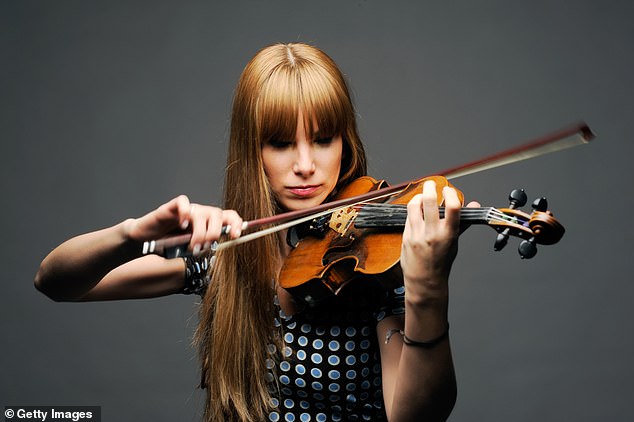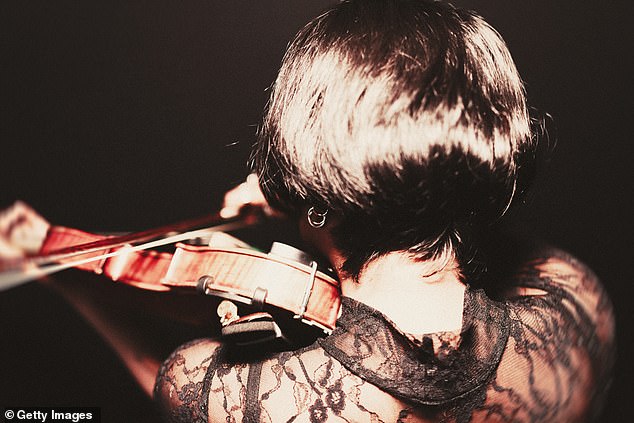The door had barely closed when the world-renowned trumpet player who had invited 13-year-old Agnes Green to his room lunged at her, pinning her to the ground, tearing off her jeans and underwear.
In an instant, the man she’d revered, who’d been teaching her the instrument during the week-long programme run by one of Britain’s foremost music schools was gone; in his place, a violent stranger more than twice her age trying to rape her.
‘I was terrified. I didn’t understand why he was doing it. I screamed and screamed,’ recalls Agnes, now 27.
Hearing the commotion, a friend of the musician burst into the room, and Agnes managed to run away.
‘It was the last day. I went home and didn’t tell my mum — she would have been devastated. She’d trusted this school to look after me,’ says Agnes.
Low-level harassment of female classical musicians – including children – is so prevalent, many don’t even see themselves as victims (stock image)
While she is now a successful classical musician herself, her fame is dwarfed by that of her attacker.
‘People are in awe of his playing. But I can’t bear to look at his face. If he did this to me, I worry it has happened to others,’ says Agnes.
‘I tried to block it out for a long time, but the older I get, the harder I find it.’
Shockingly, she is not alone in her experience of sexual assault — her ordeal making essential, if uncomfortable, reading for parents who place their talented teenagers in the care of music schools across the country.
Just this week, cellist Julian Lloyd Webber suggested one-to-one tuition at classical academies should be stopped altogether, as it emerged that Professor Mark Messenger, a violinist and teacher at the Royal College of Music, has been suspended amid unspecified allegations of misconduct.
Messenger is believed to deny the claims made against him but has made no public comment. There is no suggestion that the allegations are of a sexual nature.
‘There is no need for one-to-one tuition to continue,’ said Lloyd Webber, who studied at the college in London, following his older brother Andrew and their father, the composer William Lloyd Webber.
‘I personally think groups of three are the best size now for any lesson. It would mean there was much more openness and accountability.’

Cellist Julian LLoyd Webber (pictured) says there is ‘no need for one-to-one tuition to continue’, saying that teaching in small groups means there is ‘much more openness and accountability’
Though many artists have spoken out about instances of sexual abuse in the pop industry in recent years, it seems the problem is also rife within the classical world.
And perhaps most alarmingly, as FEMAIL’s investigation below found, this worrying behaviour is being seen all the way down to the grassroots of classical music, where the female musicians being assaulted are still children.
Last year, a report by the Independent Society of Musicians (ISM), the industry’s professional body for artists of all kinds, found 66 per cent of respondents had experienced discrimination, and that sexual harassment exists on a ‘devastating scale’.
Despite changes in other professions as a result of the MeToo movement, in the music industry it has made ‘no difference at all’, says ISM chief executive Deborah Annetts.
‘Bad behaviours are taking place everywhere from recording studios through to orchestras through to live performances,’ she tells me.
‘Our data showed assaults taking place in dressing rooms. On stage, women were being grabbed. One woman talked about always going on tour with a sleeping bag that went up to her neck, so she was not touched up.’
Abuse continues, she says, as musicians often have no access to a human resources body, ‘which means perpetrators go unpunished’.
Much of the abuse is historic and only now being acknowledged. And it is being seen from the moment girls and young women first display talent for an instrument.
In 2013, Michael Brewer, the former head of music at the prestigious Chetham’s Music School in Manchester, was jailed for sexually abusing a pupil.
Many other pupils came forward with accusations about Chetham’s teachers, including violin teacher Chris Ling, who police had begun investigating in 1990.
The allegations against Ling – who took his own life before the case came to court – included that he forced his pupils to play the violin naked, spanked them when they made mistakes and forced them to perform sex acts.
Unlike normal classes, where there will be as many as 30 pupils in the room, music lessons are usually conducted on a one-on-one basis, often in close physical proximity.
Teachers have justifiable reasons for physical contact with students, such as adjusting finger positions on an instrument and demonstrating the proper breathing techniques.
When it comes to music groups and orchestras, even in dedicated youth ensembles members can span a wide age range, blurring normal adult-child boundaries.
Students report that while on musical tours or at holiday schools, attitudes towards socialising are far looser, with supervision of young people less strict than on a normal school trip. Opportunities for abuse can be more frequent.

One young female musician (not pictured) said that she felt ‘trapped in this industry because it is so small, and you don’t want opportunities taken away’ (stock image)
From the moment Agnes Green first picked up a trumpet aged seven, she was hooked on the sense of community and freedom the instrument provided. Her mother, an accountant, and father, an artist, loved watching their daughter thrive.
When she was 12, they sent her to a specialist music school where she could devote more time to her playing. When Agnes asked to attend a summer school at the end of her first year there, they didn’t hesitate.
The week-long programme was held on a campus, with students and freelance music teachers staying on site in boarding accommodation.
‘I was excited about the opportunity to study with these musicians, but looking back we were all young and vulnerable,’ says Agnes, who says the atmosphere was more relaxed than at a conventional school.
With only three or four teachers to monitor the 70-odd students – half of whom were mature — supervision sounds limited.
She had little social interaction with her attacker until the final day of the camp, when he invited her back to his room.
‘I thought he was amazing and was flattered,’ says Agnes, from London, who believes the assault by the musician, at the time in his 30s, was premeditated.
‘His friend, a musician who had accompanied him on the course but wasn’t teaching, came back with us. They asked if I wanted a drink. I asked for Coca-Cola, but instead they gave me something I now suspect was vodka.’
The musician’s friend left the room and the trumpet player attacked her, before his friend’s return provided the opportunity for Agnes to pull her clothes back on and run away.
Though shocked, her initial reaction was one of relief that she had escaped his clutches.
‘I told one friend who was shocked too but we never mentioned it again. I felt guilty I’d accepted a drink. He was so well known I didn’t want to be seen trying to ruin his reputation.’
He is not the only musician who harassed her as a teenager, however. Agnes recalls another well-known musician from a school holiday programme she attended aged 16, who looked up her mobile number from her admission application and sent her a message that read: ‘I want to taste you.’
The musician later worked at her music college, where the texts continued. ‘He’d write things like “I always have to sit on my hands when I’m around you,”’ recalls Agnes, who ignored all the messages until, as she turned 21, he sent her a final message to apologise for being ‘unprofessional’.
Yet Agnes believed she was penalised for not flirting back. ‘When he realised I wasn’t going to engage with his messages I started getting terrible placements at the back of the orchestra,’ she says.
‘You feel trapped in this industry because it is so small, and you don’t want opportunities taken away.’
Her attempts to come to terms with the historic abuse are stymied by the harassment she still suffers on a weekly basis as a woman in an industry where heavy drinking fuels problematic behaviour, often after performances.
‘Everyone gets drunk because it’s very stressful,’ says Agnes, who says a member of her orchestra recently grabbed her breast in the pub. ‘Every single woman who works in my industry will have a story or five similar to this, but everyone is too terrified to stick their neck out and report them.’
On the rare occasions harassment is called out, she says, nothing is done. The musician at college was reported by other students over lewd messages — yet the college boss who handled the complaint was himself, it later emerged, sleeping with students.
‘So he let him get away with it,’ says Agnes. She says the boss was eventually sacked for misconduct, but by then it was too late to probe the man sending messages.
‘Young people are so vulnerable in this industry, especially during their first experiences of working professionally. Creeps prey on that.’
Katie Manasse, 37, from Newcastle, runs music consultancy business Polyphony Arts and has supported her classical music clients with ‘multiple harassment issues from being pressured into or out of taking work, through to rape’.
She says ‘younger women dealing with men in positions of power have felt pressured to do what they want, ‘citing a choral conductor choosing female singers based on how much they flirt with him.
‘It’s an industry so dependent on reputation that if you refuse, you can lose your career,’ she explains. Katie adds that abuse of female musicians often starts at school, during one-on-one lessons.
![According to one of the musicians (not pictured), the abuse is so prevalent, that 'every single woman who works in [the] industry will have a story or five similar to this, but everyone is too terrified to stick their neck out and report them' (stock image)](https://allnewspresscdn.cloudspecter.com/deutsch/wp-content/uploads/2023/10/1697257293_262_Woman-reveals-how-musician-she-revered-tried-to-rape-her.jpg)
According to one of the musicians (not pictured), the abuse is so prevalent, that ‘every single woman who works in [the] industry will have a story or five similar to this, but everyone is too terrified to stick their neck out and report them’ (stock image)
Tatiana Pierce, now in her twenties, was assaulted by a musician in her youth orchestra while on tour aged 15, after, she suspects, her drink was spiked before their 11pm curfew on their last day.
‘We’d been out to celebrate the end of a performance,’ recalls Tatiana, a percussionist. She blacked out after drinking one vodka, her next memory being on the street outside the pub where the musician, several years her senior, stood with his penis exposed, telling her to touch it.
‘The next thing I remember I was in a bush, lying on my back. He was sitting on my chest with his penis still out. I remember being scared and pushing him away. I saw a musician I knew across the road and ran to her to help me back to our hotel.’
Back at music school, rumours swirled that Tatiana had initiated sex with her attacker.
‘I was devastated and confused. It was extremely upsetting seeing him on a daily basis. I felt he had power over me. I tried to tell people that wasn’t what happened but people brushed it off, asking what I expected if I was hanging out with an older boy.
‘I know a member of staff knew something bad happened to me, but no-one mentioned it.’
Not only did her attacker show no remorse, but years later he contacted her to ask if she wanted to form a duet. ‘I was shocked to hear from him out of the blue, as if nothing had happened.’
Low-level harassment of female classical musicians is so prevalent, many don’t even see themselves as victims.
‘You grow up thinking it’s just what happens,’ says Cecilia De Maria, 33, a harpist from London, who joined a music school aged 12. She stresses she loves her industry but says even as a child musician there was a particular image expected of her.
‘I got my first concert dress when I was 12 and was dolled up looking like a princess from quite a young age. There’s always been an emphasis on how women dress, and a lot of performing is based around image, rather than what you feel comfortable in.’
In her 20s, Cecilia recalls a woodwind player once sending her a string of lewd messages. ‘He’d contact me under the pretence of looking for musicians for gigs but emphasise them having to be sexually attractive or likely to sleep with him.
‘He’d ask if I was interested in a threesome and say a certain mutual friend “looks like she’s gagging for it”.
‘I felt uncomfortable. I’d tell him he was going too far and later found out he was messaging inappropriate comments to other women he’d worked with.’
Yet they were all unsure whether to complain to those in charge of the orchestras he worked for.
She says: ‘We could end up in the same orchestra again which would make things uncomfortable and people in high management are very often men. You don’t want to be that difficult person “making a fuss” as you may not be booked again.’
Steps are being taken to support female musicians. The Musicians’ Union has launched Safe Space, an anonymous online reporting tool to share sexism, sexual harassment and abuse.

Steps are now being taken to try and protect women in the industry – including the launch of Safe Space – an anonymous online reporting tool to share sexism, sexual harassment and abuse – by The Musicians’ Union (stock image)
Yet Katie Manasse warns that the entrenched ‘master-pupil’ relationships in music education that make the master an ‘all-powerful entity’ — entitling them to ‘make comment and judgment on the pupil’s musical technical ability, musicality, appearance, dress, personality’ — mean change is a challenge.
She believes ‘clear indication from the top down that there are not “all-powerful” people and no-one is outside the safety protocols’ needs to be instigated, along with ‘a management structure that allows for proper investigation of complaints and appropriate action to be taken’.
Unfortunately many feel that until more women feel confident calling out abuse, it’s likely little will change.
‘You’re worried about being seen as a “troublemaker”,’ says Cecilia. ‘But I’ve got a daughter now, and I’d be mortified if she went through it.’
Some names and details have been changed.

